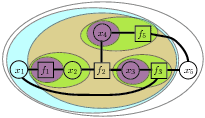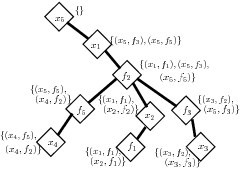
|
|
Code /
Adaptive InferenceAbout Adaptive Inference Hierarchical clustering Adaptive inference refers to the task of recomputing the results of an inference problem which is only slightly different from one which has already been solved. It uses concepts from incremental computing, in which the amount of work we expect to do to solve a problem is (hopefully) proportional to the amount of change in the problem from our already-solved version. In particular, we use rake and compress trees (RC-Trees) to cache sufficient statistics of the inference process in such a way that a large fraction of them are guaranteed to be reusable no matter what (small) changes are made to the original graphical model, including changing factors or potential functions, adding or removing variables, or modifying the graph connectivity. For a system of N variables, the sum-product version of the code can update the marginal distribution of K specified variables in O(K log N/K) time. The max-product version of the code keeps track of an optimal configuration of variables (the MPE or MAP configuration), and after any change which induces K changes in the optimal configuration, finds all those changes in O(K log N/K) time, without the locations needing to be specified. For more information, please see our publications on the subject:  RC-Tree structure
The code can be downloaded here. Please read the short usage and disclaimer statements that follow, however. Using the CodeThis code is mainly intended for educational purposes, to provide a working implementation for anyone wishing to make use of the algorithms in their own work. It is not optimized, nor does it have the greatest of user interfaces. The Matlab functions given here were used in the NIPS 2007 publication, and assume that the underlying graph is tree-structured. The SSP 2009 paper also used mainly tree-structured graphs, including HMMs, and the code should work for these problems as well, but I haven't tried it. The code includes versions for sum-product (computing marginal distributions) and dynamic programming for optimization (max-product to compute sufficient statistics, then selecting a configuration of the variables in the downward pass). The functions corresponding to each are designated "SP" and "MP", respectively. Using the MEX Functions The algorithms involved in this work rely heavily on pointers and memory re-allocation, neither of which is a strong point of the Matlab programming environment. To make the algorithms scale in the proper way, certain aspects of Matlab's memory management system were bypassed; this is done using MEX files to directly access and change the array and cell array contents. However, these functions are undocumented and are not guaranteed; they worked for me but may not work for you. Here is the disclaimer in the C files: WARNING! WARNING! WARNING! This MEX file is not for the faint of heart. It attempts to circumvent Matlab's memory-handling functions in order to give more efficient code, and uses undocumented functions to do so. It comes with no guarantees whatsoever. It may not work on other versions of Matlab, or other platforms, or even at all. It may result in memory leaks, segmentation faults, destroy data, set your computer on fire, or suck it into a black hole, for all I know. If you do not accept these possible risks, do not use this MEX file. If that doesn't deter you, assuming you have MEX properly set up (see my KDE toolbox page for some pointers on that subject) you should be able to compile the functions using the "buildmex" script. Copyright / LicenseThe adaptive inference code for Matlab was written by Alexander Ihler, and are copyrighted under the (lesser) GPL: Copyright (C) 2007-2008 Alexander Ihler This program is free software; you can redistribute it and/or modify it under the terms of the GNU Lesser General Public License as published by the Free Software Foundation; version 2.1 or later. This program is distributed in the hope that it will be useful, but WITHOUT ANY WARRANTY; without even the implied warranty of MERCHANTABILITY or FITNESS FOR A PARTICULAR PURPOSE. See the GNU Lesser General Public License for more details. You should have received a copy of the GNU Lesser General Public License along with this program; if not, write to the Free Software Foundation, Inc., 59 Temple Place - Suite 330, Boston, MA 02111-1307, USA. The authors may be contacted via email at: ihler (at) alum (.) mit (.) edu Change log |